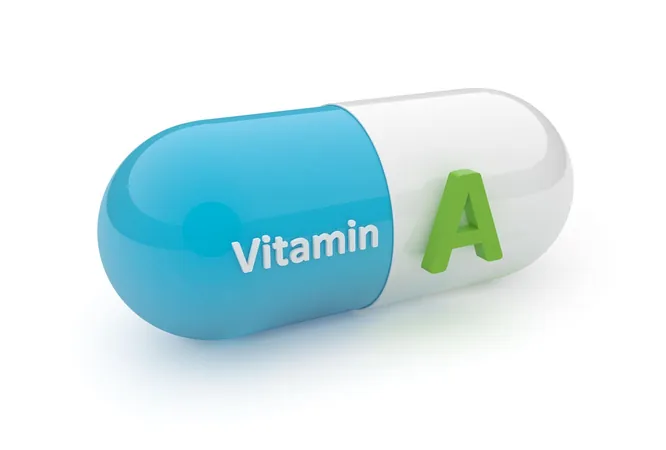
Alarming Rise of Vitamin A Toxicity in Texas Amid Measles Outbreaks
2025-04-05
Author: Emma
As measles outbreaks make a troubling resurgence in West Texas, primarily affecting unvaccinated individuals, another concerning issue has emerged—multiple reports of children suffering from vitamin A toxicity. This alarming development comes as misinformation spreads, suggesting that vitamin A can serve as a substitute for the measles, mumps, and rubella (MMR) vaccine. Covent Children’s Hospital in Lubbock, Texas, has confirmed that several children have required treatment for vitamin A toxicity, following misguided attempts by parents to prevent or treat measles using high doses of the vitamin without proper medical advice.
The Measles Crisis: A Return of Health Risks
Since the elimination of measles in the U.S. around the year 2000, attributed largely to effective vaccination campaigns, the return of this virus should be alarming. Unfortunately, a decrease in MMR vaccination rates—fueled by a wave of misinformation that has been perpetuated over the years—has allowed measles outbreaks to resurface. Recent statistics show a staggering 481 reported cases in western Texas alone, with 59 new infections identified in just the last three days. These outbreaks pose a serious risk, not just for those infected, but for the broader community, including vulnerable populations such as infants and those with compromised immune systems.
The Dangerous Consequences of Misguided Health Practices
The situation has escalated in 2025, with children being hospitalized for complications stemming from measles. During routine tests, many of these cases revealed troubling levels of vitamin A in their systems, leading to diagnoses of hypervitaminosis A—essentially, vitamin A toxicity. This condition can have severe consequences, including liver damage, blurred vision, heightened sensitivity to sunlight, and other debilitating health issues.
Parents, in a misguided effort to replace vaccinations with so-called “natural” remedies like vitamin A, have inadvertently put their children at significant risk. Despite vitamin A being essential for health, especially in childhood, the dangers of overdosing—often from consuming excessive supplements rather than food sources—are starkly evident. The complexities of vitamin A consumption are often overlooked; while fruits, vegetables, fish, and dairy are healthy sources of this vitamin, the nuances of its bioactivity mean that excess intake can lead to serious health complications.
Understanding Vitamin A and Its Risks
Vitamin A can be naturally obtained from a variety of foods, but when taken in supplement form, the risk of toxicity rises significantly. Children aged 1 to 3 should have a recommended daily allowance (RDA) of 300 micrograms, while those aged 14 and older require between 700-900 micrograms, depending on gender. Parents looking to supplement their child’s diet with vitamin A must do so cautiously and ideally should prioritize dietary sources over pills or syrups.
Complications from excessive vitamin A include skin irritations, bone pain, headaches, and in severe cases, kidney damage. Particularly concerning is the impact on pregnant women, as large amounts of vitamin A intake can lead to birth defects in developing babies.
The Path Forward: Preventing Vitamin A Toxicity and Measles
To address the rising cases of vitamin A toxicity, it is imperative for parents to seek proper medical guidance and to stop administering excessive supplements. Education is key; understanding the importance of vaccinations—including the MMR vaccine—should take precedence over potentially harmful, untested remedies fueled by unfounded fears.
Once a health issue contained to previous generations, measles is now re-emerging, proving that the fight against misinformation is ongoing. Vaccine hesitancy has led to not just the return of measles but also side effects like vitamin A toxicity from desperate attempts to find alternatives. Public health officials urge communities to combat this cycle of misinformation and prioritize vaccination, to ensure both the health and safety of children and the community as a whole.
Conclusion: The Importance of Science-Based Health Decisions
Ultimately, a return to science-based health decisions and a commitment to vaccinations can help avoid a repeat of the past. Parents should understand the established safety and efficacy of vaccines and work closely with healthcare providers to safeguard their children's health. With measles cases on the rise and toxicities from misguided vitamin supplementation becoming more common, the responsibility lies with individuals and communities to prioritize knowledge and preventive care for a healthier future.









 Brasil (PT)
Brasil (PT)
 Canada (EN)
Canada (EN)
 Chile (ES)
Chile (ES)
 Česko (CS)
Česko (CS)
 대한민국 (KO)
대한민국 (KO)
 España (ES)
España (ES)
 France (FR)
France (FR)
 Hong Kong (EN)
Hong Kong (EN)
 Italia (IT)
Italia (IT)
 日本 (JA)
日本 (JA)
 Magyarország (HU)
Magyarország (HU)
 Norge (NO)
Norge (NO)
 Polska (PL)
Polska (PL)
 Schweiz (DE)
Schweiz (DE)
 Singapore (EN)
Singapore (EN)
 Sverige (SV)
Sverige (SV)
 Suomi (FI)
Suomi (FI)
 Türkiye (TR)
Türkiye (TR)
 الإمارات العربية المتحدة (AR)
الإمارات العربية المتحدة (AR)